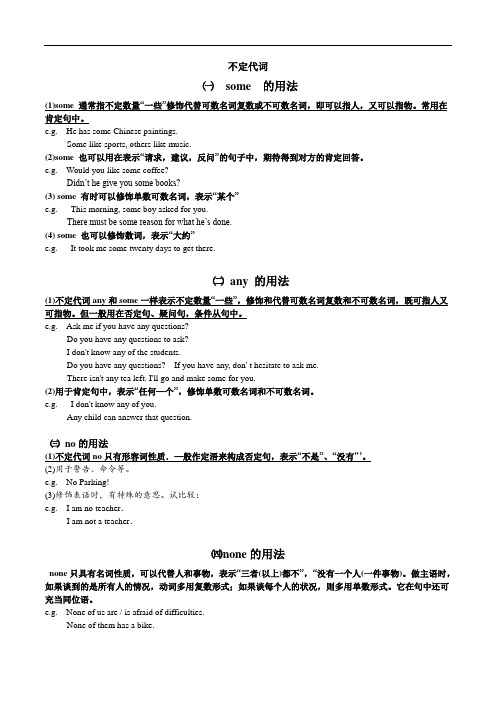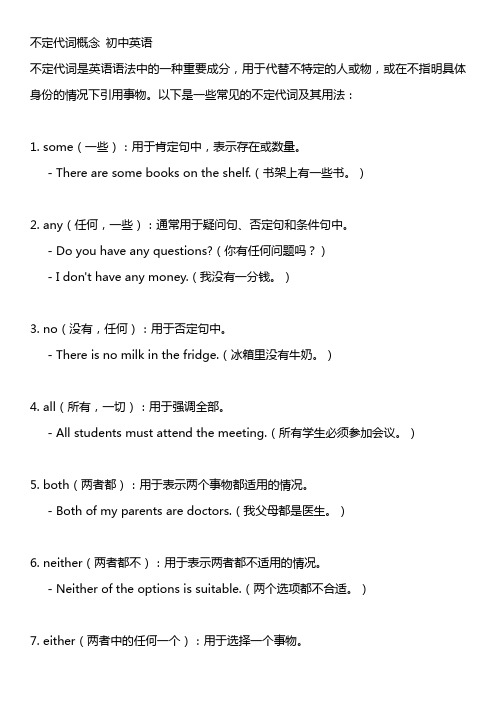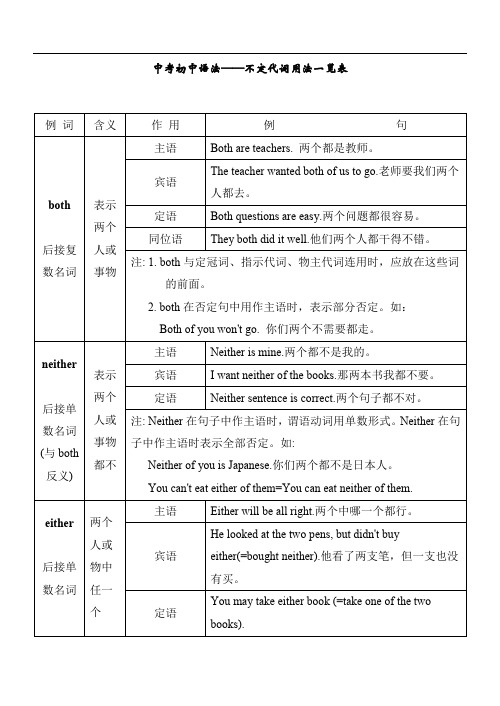初中英语-不定代词用法详解
2024年初中英语语法归纳之不定代词用法例举

2024年初中英语语法归纳之不定代词用法例举①一般用于肯定句中的不定代词:some, someone, somebody, something。
②一般用于否定句、疑问句和条件句中的不定代词:any, anyone, anybody, anything。
③一般用于句中表示否定意义的不定代词:no, no one, nobody, nothing。
④不定代词one指代可数名词,既可指人,亦可指物,它可以代替上文中出现的单数可数名词,指代复数名词时可以用ones。
⑤none通常只用作名词,在句中作主语、宾语等。
意为“没有任何(人或物)”,既可指人,亦可指物。
⑥both指两个人、物或群体;all指三个以上的人、物或群体或泛指一切事物。
⑦each一般用于指两个或两个以上的人或物,侧重个别;every 用于指三个或三个以上的人或物,侧重全体。
而且each所指对象在上下文中已十分明确。
⑧other具有名词和形容词性质,既可指人,亦可指物。
other 常与定冠词the连用。
不定冠词an与other连用则组成another。
other只作形容词或代词,表示“其他的,别的”,不可单独使用。
the other作形容词或代词,特指两者中或两部分的另一个或另一部分。
others相当于“other+名词”,泛指“别的人或物”,只有名词性用法。
the others相当于“the other+名词”,表示“剩下的,其余的”,特指除此之外的全部人或物。
another作形容词或代词,泛指三个或三个以上不定数目中的“另一个”。
⑨either指“两者中的任何一个”;neither指“两者中无一”,具有否定意义。
⑩many和much具有名词和形容词的性质,都表示“许多、大量”。
Much一般只能指代或修饰不可数名词,many只能指代或修饰复数可数名词。
Most指“大部分、大多数”。
(11) a few 和a little 意为“少数、少量”,其意义是肯定的。
(完整)不定代词讲解(初中英语语法)

不定代词㈠some 的用法(1)some 通常指不定数量“一些”修饰代替可数名词复数或不可数名词,即可以指人,又可以指物。
常用在肯定句中。
e.g. He has some Chinese paintings.Some like sports, others like music.(2)some 也可以用在表示“请求,建议,反问”的句子中,期待得到对方的肯定回答。
e.g. Would you like some coffee?Didn’t he give you some books?(3) some 有时可以修饰单数可数名词,表示“某个”e.g. This morning, some boy asked for you.There must be some reason for what he’s done.(4) some 也可以修饰数词,表示“大约”e.g. It took me some twenty days to get there.㈡any 的用法(1)不定代词any和some一样表示不定数量“一些”,修饰和代替可数名词复数和不可数名词,既可指人又可指物。
但一般用在否定句、疑问句,条件从句中。
e.g. Ask me if you have any questions?Do you have any questions to ask?I don't know any of the students.Do you have any questions? If you have any, don' t hesitate to ask me.There isn't any tea left. I'll go and make some for you.(2)用于肯定句中,表示“任何—个”,修饰单数可数名词和不可数名词。
e.g. I don't know any of you.Any child can answer that question.㈢no的用法(1)不定代词no只有形容词性质.—般作定浯来构成否定句,表示“不是”、“没有"’。
初中英语知识点归纳代词的不定代词和疑问代词的用法

初中英语知识点归纳代词的不定代词和疑问代词的用法代词在英语中起到替代名词的作用,可以简化语言表达并避免重复。
在这篇文章中,我们将介绍代词的种类以及不定代词和疑问代词的用法。
一、代词的种类代词分为人称代词、物主代词、指示代词、不定代词和疑问代词。
二、人称代词人称代词用来代替人物。
主要分为主格和宾格两种形式。
主格:I(我)、you(你)、he(他)、she(她)、it(它)、we (我们)、they(他们/她们/它们)宾格:me(我)、you(你)、him(他)、her(她)、it(它)、us(我们)、them(他们/她们/它们)三、物主代词物主代词用来表达所属关系。
分为形容词性物主代词和名词性物主代词两种形式。
形容词性物主代词:my(我的)、your(你的)、his(他的)、her(她的)、its(它的)、our(我们的)、their(他们/她们/它们的)名词性物主代词:mine(我的)、yours(你的)、his(他的)、hers(她的)、its(它的)、ours(我们的)、theirs(他们/她们/它们的)四、指示代词指示代词用于指示特定的人或事物。
分为单数和复数两种形式。
单数:this(这个)、that(那个)复数:these(这些)、those(那些)五、不定代词不定代词用来表示不确定的人或物,没有特定的指向。
常用的不定代词有:some(一些)、any(任何)、no(没有)、every(每个)、all(所有)、none(没有人/没有东西)、few(一些)、many(许多)、several(几个)、both(两者都)、either(两者之一)、neither(两者都不)、one(一个)六、疑问代词疑问代词用来提问。
常用的疑问代词有:who(谁)、whom(谁,宾格)、what(什么)、which(哪个)、whose(谁的)七、不定代词的用法1. some和any- some用于肯定句中,表示某种程度的数量或程度; - any用于否定句和疑问句中,表示任何或任何一些。
初三-不定代词的用法总结-修正版PPT课件

none 没有一个 one other 其它的
.
3
(2)普通不定代词的用法
★ some与any
• 一般说来,some 用于肯定句中,any 用于否定句、疑问句和条件句中。如: • ①肯定句:He asked some questions. 他问了一些问题。 • ②否定句:He didn’t ask any questions. 他没有问任何问题。 • ③疑问句:Did he ask any questions? 他问了些问题没有? • 但是,在表示请求、邀请或征求意见的句子中,希望对方的肯定回答,通常要用 some 而
• There is only a little milk in the glass. • He has few friends. • They had little money with them. • 2)a little和little也可以用作副词,a little表示“有点,稍微”,
little表示“很少”。 • I'm a little hungry. (修饰形容词hungry) • Let him sleep a little. (修饰动词sleep) • Mary, go a little faster, please. (修饰副词比较级) • She slept very little last night.
.
4
• ★ many与much
• 两者意思相同,都表示“许多”,但用法不同,many用于修饰或代替可数名 词;而much用于修饰或代替不可数名词。如:
• ① Many trees fell in the storm. 在暴风雨中许多树倒了。 • ② Much money has been wasted that way. 很多钱都这样浪费了。
不定代词 初中英语

不定代词概念初中英语不定代词是英语语法中的一种重要成分,用于代替不特定的人或物,或在不指明具体身份的情况下引用事物。
以下是一些常见的不定代词及其用法:1. some(一些):用于肯定句中,表示存在或数量。
- There are some books on the shelf.(书架上有一些书。
)2. any(任何,一些):通常用于疑问句、否定句和条件句中。
- Do you have any questions?(你有任何问题吗?)- I don't have any money.(我没有一分钱。
)3. no(没有,任何):用于否定句中。
- There is no milk in the fridge.(冰箱里没有牛奶。
)4. all(所有,一切):用于强调全部。
- All students must attend the meeting.(所有学生必须参加会议。
)5. both(两者都):用于表示两个事物都适用的情况。
- Both of my parents are doctors.(我父母都是医生。
)6. neither(两者都不):用于表示两者都不适用的情况。
- Neither of the options is suitable.(两个选项都不合适。
)7. either(两者中的任何一个):用于选择一个事物。
- You can take either of the two routes.(你可以选择两条路中的任何一条。
)8. none(没有一个):用于表示一个或多个事物都不存在的情况。
- None of the students passed the test.(没有一个学生通过了考试。
)9. someone(某人):用于指代某个特定的人。
- Someone is knocking on the door.(有人在敲门。
)10. something(某事,某物):用于指代某个特定的事物。
初中英语语法不定代词讲解及习题

初中英语语法不定代词讲解及习题不定代词一、不定代词概述定义不指明代替任何特定名词或形容词的代词some 类something, somebody, someone any 类no 类every 类常见不定代词其他all, each, both, none, one, much, many, (a)few, (a)little, either, neither, other, another 不定代词充当成分作主语、宾语、表语、定语等二、常见不定代词的基本用法1、some 和any: 都是“一些”的意思,都可与可数名词复数或不可数名词连用。
(1)some 一般用于肯定句中,any 一般用于否定句或疑问句中。
Eg. ___________________________________________________________ ___________________________________________________________(2)在表示请求、建议或希望得到肯定回答的疑问句中,应该用some 而不用any 。
Eg. Would you please give me some paper?___________________________________________________________(3)当any 表示“任何”或“无论哪一个”的意义时,可以用于肯定句,此时any 要重读。
Eg. You may come at any time that is convenient to you.___________________________________________________________2、表示数量的不定代词(1)many______, few_______, a few_______, 用以代替或修饰可数名词。
(2)much______, little_______, a little________,用以代替或修饰不可数名词。
最新中考初中语法——不定代词用法一览表

中考初中语法——不定代词用法一览表例词含义作用例句both后接复数名词表示两个人或事物主语Both are teachers. 两个都是教师。
宾语The teacher wanted both of us to go.老师要我们两个人都去。
定语Both questions are easy.两个问题都很容易。
同位语They both did it well.他们两个人都干得不错。
注: 1. both与定冠词、指示代词、物主代词连用时,应放在这些词的前面。
2. both在否定句中用作主语时,表示部分否定。
如:Both of you won't go. 你们两个不需要都走。
neither后接单数名词(与both 反义) 表示两个人或事物都不主语Neither is mine.两个都不是我的。
宾语I want neither of the books.那两本书我都不要。
定语Neither sentence is correct.两个句子都不对。
注: Neither在句子中作主语时,谓语动词用单数形式。
Neither在句子中作主语时表示全部否定。
如:Neither of you is Japanese.你们两个都不是日本人。
You can't eat either of them=You can eat neither of them.either后接单数名词两个人或物中任一个主语Either will be all right.两个中哪一个都行。
宾语He looked at the two pens, but didn't buyeither(=bought neither).他看了两支笔,但一支也没有买。
定语You may take either book (=take one of the twobooks).=You can't take both of the two books. 两本书你可以任选一本。
初中英语语法不定代词讲义

初中英语语法不定代词讲义(总7页)--本页仅作为文档封面,使用时请直接删除即可----内页可以根据需求调整合适字体及大小--不定代词一、不定代词的定义:不指明代替任何特定名词或形容词的代词叫做不定代词。
不定代词在句中可以作主语、宾语、表语或定语等。
不定代词可以分为一般不定代词和复合不定代词。
二、一般不定代词及用法1. some/any 含义:“一些”,既可以修饰可数名词,也可以修饰不可数名词。
区别:1). some用于陈肯句;any用于疑问句或否定句。
I can see some flowers, but I can`t see any apples.2). some 用在疑问句中有表示请求或建议的功能;any用在肯定句中有强调或加强语气的功能,意为“任何”。
Would you like some coffee?You may come at any time.There are too many mistakes in your diary. So many people are waiting for the bus.Sorry, I’m afraid I can’t go with you. I’ve got too much work to do.朋友。
We still have a little time. There is little time left.I don’t like this green pencil, please give me another one.In our class, some students like playing football, others like playing basketball.There are seven people in Running Man. One is a woman, and the others are men.三、复合不定代词及用法1. 复合不定代词的构成:复合不定代词是由some-,any-,no-,every-加上-one不定代词之后。
- 1、下载文档前请自行甄别文档内容的完整性,平台不提供额外的编辑、内容补充、找答案等附加服务。
- 2、"仅部分预览"的文档,不可在线预览部分如存在完整性等问题,可反馈申请退款(可完整预览的文档不适用该条件!)。
- 3、如文档侵犯您的权益,请联系客服反馈,我们会尽快为您处理(人工客服工作时间:9:00-18:30)。
不定代词用法详解不定代词,不明确指代某个特定的人或事物的代词叫不定代词。
不定代词可以代替名次和形容词,表示不同的数量概念。
不定代词没有主格和宾格之分,在句中可做主语、宾语、表语、定语等。
英语中的不定代词常常成对出现,如some 和any, all 和both, neither 和either, each 和every, other 和another, much 和many, one 和no, none和no one, few 和 a few,little 和a little,等等。
另外,还有由some, any, every, no 与body, one, thing构成的复合不定代词(somebody, anybody, everybody, nobody, someone, anyone, everyone, no one, something, anything, everything, nothing)。
1. some 和anysome 和any都可修饰或指代可数名词和不可数名词;some 一般用于肯定句,any一般用于疑问句和否定句。
如:I must get some fruit in the market. 我得在市场上买点水果。
Do you have any books for children? 你有适合小孩子看的书吗?【说明】(1) 当表示请求或要求并希望对方能给出肯定的回答时,some 也可用于疑问句;any 表示“任何的”之意时,也可用于肯定句。
Can you give me some paper? 你能给我些纸吗?Why not send that girl some flowers? 为什么不送给那位女孩几束花呢?You can read any of the books. 你可以看这些书中的任何一本。
(2) some 和any均不能跟冠词连用。
2. all 和both(1) all表示全部,表示三者或三者以上的人或物;both指代两个人或事物,表示两者都。
Copper and silver are both metals. 铜和银都是金属。
Both sides are keen to reach an agreement. 双方都很想达成协议。
She and her husband both like dancing. 她和丈夫都喜欢跳舞。
There are trees on both sides of the street. 街道两旁都有树。
Not all women like the word Ms. 并非所有的女性都喜欢Ms这个词。
(2)all 和both都可以与定冠词连用,置于定冠词之前。
Are all the students here today? 今天所有的学生都到了吗?【说明】在句子中用作同位语时,一般放在行为动词之前,情态动词、系动词be或助动词之后,但当行为动词或表语省略时,all, both放在情态动词、系动词be或助动词之前。
They haven’t been there, but we both have. 我们没有去过那儿,但我们俩去过。
(3)All,both与not连用表示部分否定。
All birds can not fly. 不是所有的鸟都会飞。
All that glitters is not gold. 并不是所有发光的都是金子。
Both men and women are not of the same character. 男人和女人的性格特点不都一样。
3. neither 和eitherneither 和either 均用于指两者,neither 意为“两者都不”,either意为“两者之一”、“任意一方”。
如:Neither of us enjoy getting up early. 我们俩谁也不喜欢早起。
There are trees on either side of the street. 街道两边都有树。
She’s the kind of person you either love or hate. 她是那种叫你不是爱就是恨的人。
Here are two shirts ,you can take either of them. 这儿有两件衬衫,你拿哪件都可以。
I agree with neither of you. 你们两人的意见我都不同意。
【说明】(1)只用于指两者,指三者或多者要用none 和any。
(2) neither 有时可视为either 的否定式,即neither= not either。
(3) 两者均可修饰名词,但被修饰名词要用单数形式。
4. each 和every(1)each 强调个体,指两者或两者以上的人或物,在句子中可用作主语、宾语,也可做定语(修饰单数可数名词);every强调全体,只能指三者或三者以上的人或物,在句子中只能做定语,修饰单数可数名词。
Each has something to say. 每个人都有话要讲。
Each child was given a Christmas gift. 每个孩子都得到了圣诞礼物。
You should give 20 dollars to each. 你应该给每个人20美元。
Every minute is important to us. 每一分钟对我们都是重要的。
I read English every morning. 我每天早晨读英语。
(2)each of后面直接接人称代词复数(us,them,you),不能直接接名词,必须在复数名词前加限定词(the或my,his,her,our等物主代词)Each of us has got something to say.Each of my sisters has a storybook.(3) 两个用and 连接的名词若受each或every修饰且用作主语时,其谓语依然用单数。
如:Every [Each] boy and girl has one. 每个男孩和女孩都有一个。
但是,each 用于复数主语后作同位语,后面的谓语用复数。
如:The students each have a dictionary. 学生每人有一本字典。
(4) every 后接“数字或few +名词”可表示“每……”,而each 一般这样用。
如:He comes home every two weeks. 他每隔两周回家一次。
注意:(1) each 指两者或两者以上的“每个”,every 指三者或三者以上“每个”,因此指两者时只能用each。
如:He could write with either hand. 他两只手都能写字。
(2) every 可受almost, nearly 等副词的修饰,但each 却不能。
5. one, another(1) one 指一个或相似的一个;another指另外的一个,表泛指。
如:Please give me another. 请给我另一个。
I haven’t a book; can you lend me one? 我没有书,你能借我一本吗?【说明】another 可以修饰one,但one 不能修饰another。
如:Please give me another one. 请给我另一个。
(2) one 可与this, that, the 等连用,表示特指;another不能与这些词连用,也不能表示特指。
如:This one is better than the one over there. 这个比那边的那个好些。
(3) 在一定范围内,表示其中的一个用one,表示另一个可用one或another。
如:One boy was reading; one [another] was writing. 一个男孩在读书,另一个在写字。
注意:若指两者中的一个和另一个,则用one…the other。
6. other, the other, others, the others(1) 带定冠词的the other, the others 表特指,而不带定冠词的other, others 表泛指。
如:Don’t cut in when others are talking. 别人说话时别插话。
Only Jim was there. The others had left. 只有吉姆在那儿,其余的人都离开了。
(2) other 和the other 后可修饰名词,也可单独使用;而others 和the others 则只能单独使用,不能修饰名词。
如可说the other people,但不能说the others people。
(3)other 和the other 既可表示单数也可表示复数,具体视它所表代替或修饰名词的单复数而定,而others 和the others 则永远表示复数。
(4)注意正确理解以下短语的意思:every other 每隔一……,其他的……都none other than 不是别的,正是……no other than 不是别的,正是……one after the other 一个接一个地,相继one from the other 分别,各别some . . . or other 某一个other than 不同于,除了the other day 早几天,几天前7. much和manymuch 修饰或指代不可数名词,many修饰或指代可数名词(复数)。
His name is familiar to many people. 他的名字许多人熟悉。
The children have too much homework to do. 孩子们家庭作业太多。
【说明】many 的以下用法应需注意:(1) a great many 许多(后接可数名词的复数)。
(2) many a 后接单数可数名词,相于many后接复数名词,如many a time=many times(许多次)。
8. none和no one(1) none后指人或物,其后通常接表示范围的of短语;no one 通常只用于指人,不用于指物,且其后习惯上接表示范围的of短语。
(2) no one用作主语时,谓语动词用单数;none用作主语时,若指不可数名词,谓语用单数,若指可数名词,则谓语可用单数(较正式)也可用复数(用于非正式文体,但更符合惯用法)。
No one [=Nobody] likes it. 没人喜欢它。
None of the books is [are] interesting. 没有一本书有趣。
